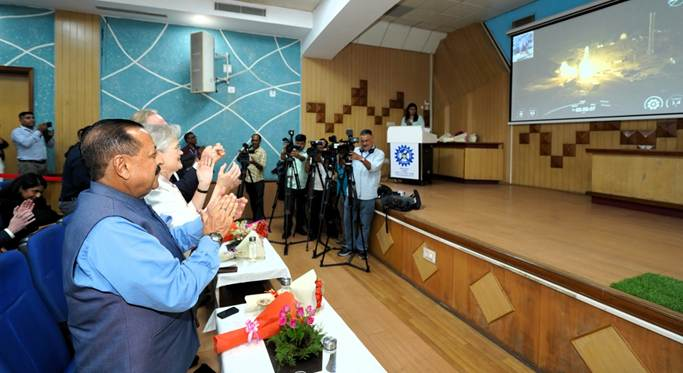Axiom-4 Marks Realisation of Vikram Sarabhai’s dream: Dr. Jitendra Singh
Dr. Singh also emphasized that India’s expanding role in space is now driven by collaboration—between nations and between government and private entities.

- Country:
- India
In a moment that will be etched into India’s scientific and national consciousness, the successful launch of the Axiom-4 Mission, featuring Group Captain Shubhanshu Shukla as the Mission Pilot, was hailed by Union Minister Dr. Jitendra Singh as a bold stride toward realizing the vision of Viksit Bharat @2047.
The event was celebrated with great enthusiasm at a special live screening held at Bhatnagar Auditorium in Anusandhan Bhawan, where a standing ovation broke out as real-time visuals of the launch played on screen. The four-member international crew is headed to the International Space Station (ISS), and Shukla’s inclusion marks a major milestone in India’s journey toward becoming a key player in global space endeavors.
Realizing the Dreams of India’s Space Pioneers
“This is the realization of the dreams of Dr. Vikram Sarabhai and Satish Dhawan, the founding architects of India’s space journey,” said Dr. Singh. “Their vision is now being brought to life under the visionary leadership of Prime Minister Narendra Modi.”
Dr. Singh emphasized that India's participation in such international missions is a direct outcome of profound policy reforms under PM Modi, which have transitioned India from a “technology follower” to a respected global partner in cutting-edge space exploration.
India’s Scientific Contribution to the Axiom-4 Mission
Highlighting the mission’s scientific significance, Dr. Singh revealed that Group Captain Shukla is carrying indigenously developed space experiment kits created by premier Indian institutions like IITs, IISc, and the Department of Biotechnology (DBT). These kits are designed to conduct biotechnology experiments on the ISS to understand the effects of microgravity and cosmic radiation on microalgae growth.
“These edible microalgae are nutrient-rich and sustainable, making them ideal candidates for long-duration space travel. Their study will help pave the way for future interplanetary missions and the long-term sustainability of human life in space,” said the Minister.
The findings from these experiments are also expected to feed directly into the Gaganyaan mission, India’s flagship indigenous human spaceflight program, and influence future bio-support systems in outer space.
International and Domestic Applause for India’s Space Rise
The launch event in New Delhi was attended by senior dignitaries including Her Excellency Frances Adamson AC, Governor of South Australia, and Mr. Philip Green, Australian High Commissioner to India. Both had earlier met with Dr. Singh to discuss further bilateral space cooperation.
Other prominent figures present included:
-
Dr. N. Kalaiselvi, Director General, CSIR
-
Dr. M. Ravichandran, Secretary, Ministry of Earth Sciences
-
Senior scientists from ISRO, DBT, DST, and other autonomous bodies
The strong international and inter-institutional turnout reflected the importance of the mission not only for India but for global collaboration in space science and technology.
India’s Space Diplomacy and Tech Ecosystem on the Rise
Dr. Singh also emphasized that India’s expanding role in space is now driven by collaboration—between nations and between government and private entities. Recent reforms have opened India’s space sector to private participation through the IN-SPACe initiative, and missions like Axiom-4 showcase how public-private synergy can accelerate scientific achievement.
The participation of Indian astronauts in globally coordinated missions is also amplifying India’s soft power and positioning it as a science diplomacy leader in the Indo-Pacific and beyond.
Axiom-4: Gateway to the Future of Indian Human Spaceflight
The Axiom-4 spacecraft is expected to dock at the ISS on June 26 at approximately 4:30 PM IST (7:00 AM EDT). Once aboard, the crew will conduct various scientific and biomedical experiments, including those supported by India, which will contribute to space sustainability research, astronaut health, and future mission design.
This mission is a precursor to India’s Gaganyaan mission, and Group Captain Shukla’s participation demonstrates the country’s growing cadre of trained, mission-ready astronauts.
“This is more than just a scientific achievement—it is a powerful symbol of India’s potential and its commitment to shaping the future of space exploration,” Dr. Singh said.
A Moment of National Inspiration
The success of the Axiom-4 launch is being celebrated across India as a defining moment that embodies the country’s technological ambitions, scientific talent, and strategic foresight. As India marches toward Viksit Bharat by 2047, milestones like these are not just achievements—they are beacons of aspiration for a new generation of Indian scientists, innovators, and explorers.
ALSO READ
In past 11 years, PM Modi gave global identity to country: UP CM Adityanath.
India's 'Golden Era': A Decade of Transformative Leadership Under PM Modi
A Decade of Transformation: PM Modi's Impact on India
Celebrating 11 Years: PM Modi's Transformative Vision for India
A Decade of Transformation: Progress Under PM Modi









